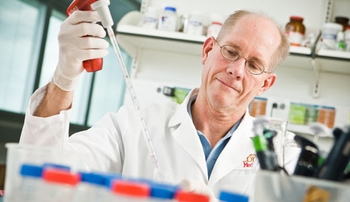Scientists have known for years that CA19-9, a glycan, or carbohydrate structure, is an important biomarker for pancreatic cancer. Clinicians use it to monitor tumor progression.
Basically, increasing CA19-9 levels suggests your cancer is getting worse; lowering CA19-9 suggests the patient is doing better.
“In the setting of patients with disease who have elevated levels of CA19-9, increasing or decreasing levels often correlate with whether they are getting worse or better,” said Tony Hollingsworth, Ph.D., Hunt Chair in Cancer Research and Leon Professor in the Eppley Institute.
But, what if the level of CA19-9 was not an indicator of worsening pancreatic cancer, but was also contributing to making the patient’s overall condition worse?
It’s an idea that Dr. Hollingsworth has been working on for decades.
That concept led to a recently completed study, published in Science, showing that CA19-9 is associated with biological activity that may contribute to disease progression.
“The important finding of this paper is that the molecules on which CA19-9 is expressed have biological activity in cancer,” Dr. Hollingsworth said.
And maybe in other diseases as well — suggesting that therapy targeted at CA19-9 could help treat patients with pancreatitis, for example.
But, back to the cancer aspect. Though this is a basic-science discovery, the project is an example of the kind of translational research that is now a major emphasis at the Fred & Pamela Buffett Cancer Center.
It’s not always bench-to-bedside — instead, this time, bedside observations led to a bench breakthrough.
Dr. Hollingsworth said the idea first came from “hints from the stories of patients” who had higher levels of CA19-9 as their prognosis grew worse.
“We always thought it was disease burden. This paper suggests that those high and rising levels of CA19-9 may be contributing to the demise of the patients,” Dr. Hollingsworth said.
Dr. Hollingsworth and other scientists will continue to study how carbohydrates attaching to proteins may contribute to cancer progression.
“We believe some biomarkers contribute to both secondary effects and malignant aspects of cancer,” he said.
This glycosylation of cancer is “poorly understood, but probably important,” Dr. Hollingsworth said.
This latest discovery is yet another clue to understanding the disease, and thus, perhaps pointing someday toward more effective treatment.
“This is just one step,” Dr. Hollingsworth said. “The story isn’t over.
“But it’s a significant step.”
The study was principally funded by UNMC’s A Longitudinal Cohort Study to Identify Clinical and Blood Markers of Early Pancreas Cancer grant.
